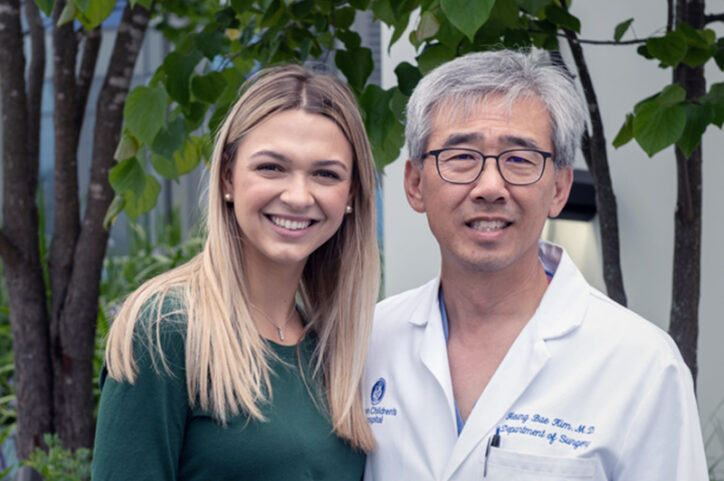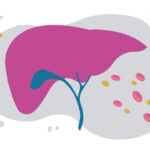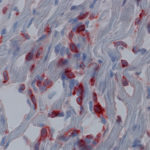From Florida to Boston and back again: Reagan’s liver transplant journey

Reagan, 18, is gearing up for her freshman year of college this fall, and she has a solid idea about her future career. “I hope to become a transplant nurse or a child life specialist,” she shares with a smile. Her inspiration to enter this field of medicine comes from her experiences with the care team that she and her family met while at Boston Children’s Hospital when she was only an infant.
Uncovering answers with urgency
Reagan was born prematurely in Florida. “It took a few hours after she was born for me to be able to see her, and when we did, I immediately saw that her color was off,” says her mom, Teresa. Reagan’s skin was turning yellow from jaundice. “I was just about to start breastfeeding her when the nurses took her for testing and said she’d be right back. But they never brought her back.” Instead, Reagan’s birth hospital immediately transported her to a nearby children’s hospital, where her health kept declining without any clear cause.
About a week after she was born, Reagan had gone from fully yellow to green on one side of her body. After days of testing, it was clear that Reagan’s case was becoming more complex. “At that point, they did let her dad, Bryan, and me hold her for the first time. It was a beautiful moment for both of us,” says Teresa. “Then we were referred to Boston Children’s immediately.”
Incredible circumstances — and a ‘miracle’
Once the family arrived at Boston Children’s, it took the team only a day of testing to identify what was happening to Reagan. She was diagnosed with a rare condition called neonatal hemochromatosis, which has since been renamed to gestational alloimmune liver disease (GALD). GALD is thought to be a maternal immune reaction to the fetus that causes severe liver disease.
“They told us that she had only 48 hours to live unless we were able to find her a liver organ match,” remembers Teresa. “Dr. Heung Bae Kim, her transplant surgeon, told us that we would need a miracle for a match to happen that quickly — and, incredibly, that’s what happened.”
Within 24 hours, the Pediatric Transplant Center’s Liver Transplant Program was able to successfully complete the organ transplant.

A community found through tough times
Teresa and Reagan stayed in Boston from December 2004 until March 2005. During this time, Teresa was able to connect with other families who were experiencing similar circumstances. The families she met while staying in a community home near Boston Children’s provided her with the emotional support that she needed to stay strong for her daughter — especially since they were both away from Bryan and her son, Carter.
Teresa’s “found family” extended to the clinicians who guided her through incredibly challenging times. “The entire care team — doctors to administration — was available at any hour for anything. It was such a loving relationship between everyone,” remembers Teresa. “From the pediatric transplant nursing director, Laura O’Melia, who has helped us from the very beginning of our journey, to Dr. Scott Elisofon and Dr. Kim, who supported us in the Liver Transplant Program — the entire team showed us that we were never alone in this.”
Living and learning
Reagan’s journey has continued through yearly visits back to Boston to monitor her health. While she has been able to have a relatively typical childhood, she is aware of the things that make her different.
“I was never able to swim in lakes or rivers with my friends because of my compromised immune system,” shares Reagan, who must take anti-rejection medication for the rest of her life. As she’s gotten older, however, she has also become more confident in advocating for her health. “I’m usually on top of taking my medications; I bring them everywhere with me. But, just in case I ever forget to take them, I’ve told my friends and peers what signs to look out for in my behavior and appearance so they can remind me to take the pills I need to keep me healthy.”
For Reagan, her transplant experience is something that she takes as a sign to do good in the world and give back to others. “I’m here for a reason, and I got this transplant for a reason. I try to make every day a good day by living it to the fullest, and I’ll never take those days for granted.”
Learn more about the Pediatric Transplant Center and register to be an organ donor.
Related Posts :
-

Running the Boston Marathon with a purpose: Ben's liver transplant journey
Ben is no stranger to sports — in fact he’s probably the most excited when he’s able to get ...
-

One day on the field, admitted to the ICU the next: Rob's liver transplant journey
When you’re a teen, it’s not very common to worry about what’s going on inside your body — ...
-

From Virginia to Boston for a kidney transplant: Joshy’s story
Joshy Buchheit is a lot like most 4-year-old boys. He loves playing in the mud, riding his scooter, and keeping ...
-

Looking for clues to improve the life of a transplanted organ
The Transplant Research Program (TxRP) at Boston Children’s Hospital is the only pediatric transplantation research program in the U....





